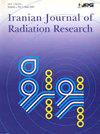Caveolin-1参与了人乳腺上皮细胞MCF10A对x射线辐射敏感性的降低
Q4 Health Professions
引用次数: 0
摘要
背景:x线胸部透视是中国健康检查程序的强制性组成部分。胸部透视的辐射剂量在x线检查中是最大的。超过一半的二十多岁患乳腺癌的女性接受过x光透视检查。研究表明,Caveolin-1参与辐照诱导的肿瘤细胞损伤DNA的修复。然而,Caveolin-1在正常人乳腺上皮细胞中的作用机制尚不清楚。材料与方法:将正常人乳腺上皮细胞(MCF10A)和Caveolin-1敲低细胞(MCF10A)暴露于x射线照射下,研究Caveolin-1在增强这些细胞放射敏感性中的作用及其机制。结果:与MCF10A细胞相比,暴露于x射线辐射后,MCF10A细胞的存活率降低,G1期和G2期细胞阻滞水平显著提高,DNA损伤修复蛋白ATM、p53和应激蛋白p38MAPK的激活水平降低。此外,在MCF10A细胞中,Caveolin-1与Mdm2的结合也低于MCF10A细胞。结论:综上所述,Caveolin-1在降低人乳腺上皮细胞的放射敏感性中起重要作用。本文章由计算机程序翻译,如有差异,请以英文原文为准。
Caveolin-1 was involved in the reduced adiosensitivity to X-ray in human mammary epithelial MCF10A cells
Background: X-ray chest fluoroscopy is a compulsory component of the health examination procedure in China. The radiation dose from chest fluoroscopy is the largest in X-ray examination. More than half of the women in their twenties with breast cancer have been given X-ray fluoroscopy. Studies have shown that Caveolin-1 is involved in the repair of damage DNA in tumor cells induced by irradiation. However the mechanism and role of Caveolin-1 in normal human mammary epithelial cells are not clear. Materials and Methods: Here, normal human mammary epithelial cells (MCF10A) and the cells with Caveolin-1 knockdown (MCF10A) were exposed to X-ray radiation to investigate the role of Caveolin-1 in the enhancement of radiosensitivity in these cells and the associated mechanism. Results: Decreased survival rate and a significantly higher level of cell arrest at the G1 and G2 phases, as well as reduced activation of the DNA damage repair proteins ATM and p53, and the stress protein p38MAPK were manifested by MCF10A cells compared to MCF10A cells, following exposure to X-ray radiation. Furthermore, binding between Caveolin-1 and Mdm2 in MCF10A cells was also lower than in MCF10A cells. Conclusion: Overall, the finding indicated that Caveolin-1 played an important role in decreasing the radiosensitivity of human mammary epithelial cells.
求助全文
通过发布文献求助,成功后即可免费获取论文全文。
去求助
来源期刊

Iranian Journal of Radiation Research
RADIOLOGY, NUCLEAR MEDICINE & MEDICAL IMAGING-
CiteScore
0.67
自引率
0.00%
发文量
0
审稿时长
>12 weeks
期刊介绍:
Iranian Journal of Radiation Research (IJRR) publishes original scientific research and clinical investigations related to radiation oncology, radiation biology, and Medical and health physics. The clinical studies submitted for publication include experimental studies of combined modality treatment, especially chemoradiotherapy approaches, and relevant innovations in hyperthermia, brachytherapy, high LET irradiation, nuclear medicine, dosimetry, tumor imaging, radiation treatment planning, radiosensitizers, and radioprotectors. All manuscripts must pass stringent peer-review and only papers that are rated of high scientific quality are accepted.
 求助内容:
求助内容: 应助结果提醒方式:
应助结果提醒方式:


